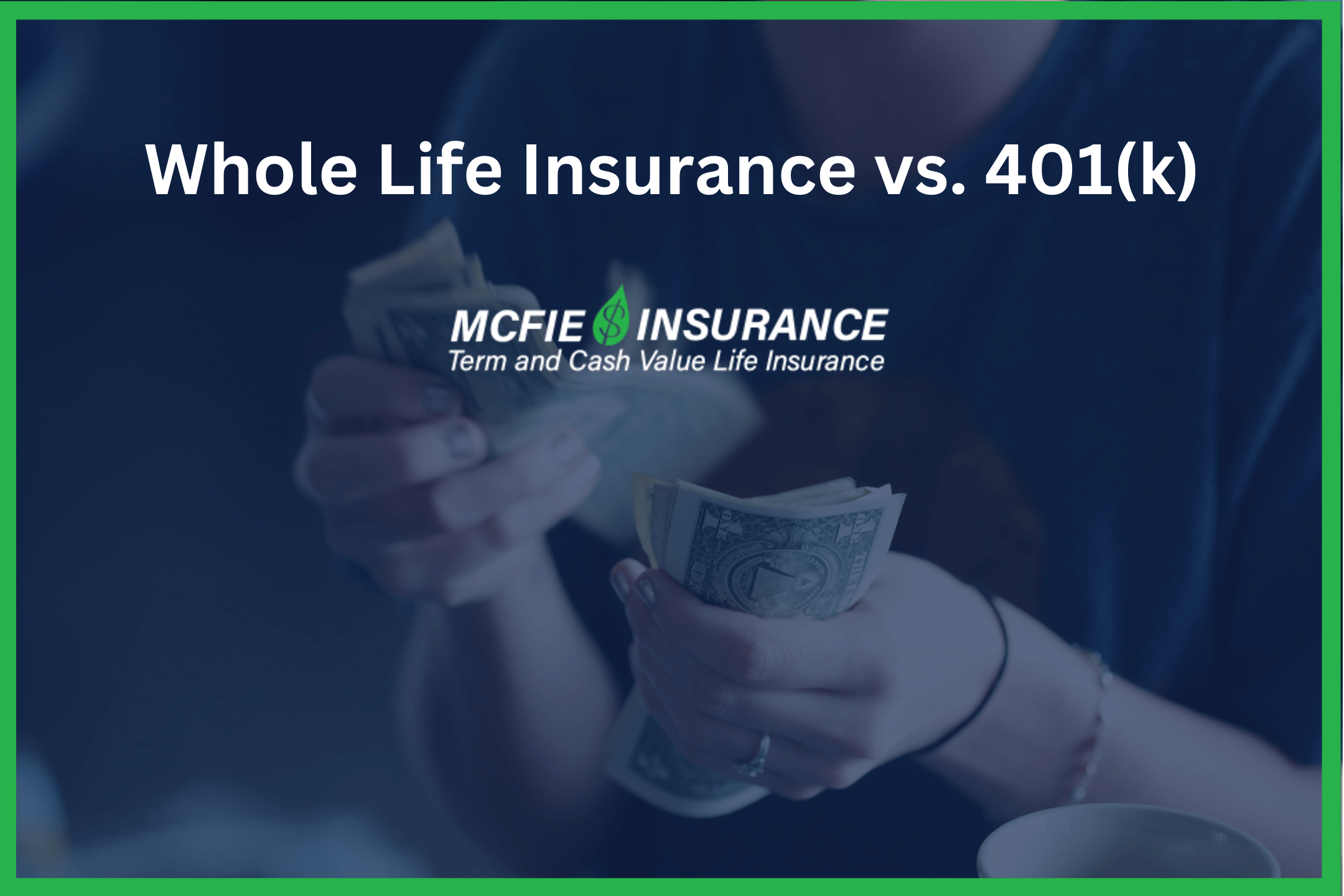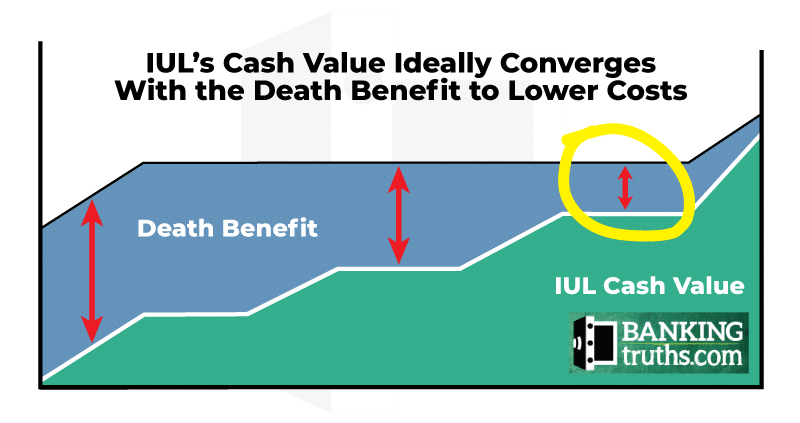All Categories
Featured
Table of Contents
Below is a hypothetical contrast of historical performance of 401(K)/ S&P 500 and IUL. Let's assume Mr. SP and Mr. IUL both had $100,000 to saved at the end of 1997. Mr. SP spent his 401(K) cash in S&P 500 index funds, while Mr. IUL's money was the cash money worth in his IUL policy.
IUL's plan is 0 and the cap is 12%. Since his money was conserved in a life insurance plan, he does not need to pay tax!
Should You Invest In A Roth Ira, Iul, Or 401(k)?

The countless options can be mind boggling while researching your retirement investing choices. However, there are particular decisions that ought to not be either/or. Life insurance policy pays a survivor benefit to your beneficiaries if you must die while the plan is in impact. If your family would face financial hardship in case of your death, life insurance policy supplies peace of mind.
It's not one of the most profitable life insurance financial investment strategies, yet it is one of the most safe and secure. A kind of permanent life insurance policy, global life insurance policy enables you to choose just how much of your premium goes toward your fatality benefit and just how much goes into the plan to gather cash worth.

Additionally, IULs allow insurance policy holders to secure lendings versus their policy's money worth without being tired as earnings, though unsettled equilibriums might be subject to tax obligations and penalties. The main advantage of an IUL plan is its possibility for tax-deferred development. This indicates that any type of earnings within the policy are not taxed up until they are taken out.
Alternatively, an IUL policy may not be one of the most ideal financial savings plan for some individuals, and a traditional 401(k) can prove to be extra advantageous. Indexed Universal Life Insurance Coverage (IUL) policies provide tax-deferred development potential, protection from market declines, and survivor benefit for recipients. They permit insurance policy holders to earn interest based upon the performance of a stock exchange index while shielding against losses.
529 Plan Vs Iul
A 401(k) plan is a popular retired life financial savings choice that allows people to spend money pre-tax into different financial investment devices such as mutual funds or ETFs. Employers might also supply matching contributions, further boosting your retired life cost savings potential. There are 2 main kinds of 401(k)s: conventional and Roth. With a standard 401(k), you can lower your taxed earnings for the year by contributing pre-tax bucks from your income, while likewise taking advantage of tax-deferred growth and employer matching contributions.
Lots of employers also supply matching contributions, efficiently providing you free money towards your retired life plan. Roth 401(k)s feature in a similar way to their typical equivalents however with one key distinction: taxes on payments are paid upfront rather of upon withdrawal during retirement years (IUL vs 401k risk comparison). This suggests that if you expect to be in a higher tax obligation bracket throughout retired life, adding to a Roth account might save money on tax obligations gradually compared to spending exclusively via traditional accounts (resource)

With reduced monitoring fees usually contrasted to IULs, these kinds of accounts allow capitalists to conserve money over the long-term while still taking advantage of tax-deferred growth possibility. Additionally, several preferred inexpensive index funds are offered within these account types. Taking distributions prior to reaching age 59 from either an IUL policy's money value through fundings or withdrawals from a standard 401(k) strategy can result in damaging tax obligation ramifications if not managed meticulously: While borrowing against your policy's money value is generally considered tax-free as much as the quantity paid in costs, any kind of overdue financing equilibrium at the time of fatality or policy surrender might go through revenue tax obligations and fines.
Roth Ira Vs Iul: Making The Best Choice For Retirement Savings
A 401(k) offers pre-tax investments, company matching contributions, and possibly even more financial investment choices. The downsides of an IUL include higher administrative prices compared to standard retirement accounts, limitations in investment options due to policy limitations, and possible caps on returns during solid market efficiencies.

While IUL insurance might prove valuable to some, it's vital to comprehend how it functions prior to acquiring a plan. There are a number of benefits and drawbacks in comparison to various other kinds of life insurance policy. Indexed global life (IUL) insurance coverage supply better upside possible, flexibility, and tax-free gains. This kind of life insurance offers irreversible protection as long as costs are paid.
companies by market capitalization. As the index goes up or down, so does the price of return on the cash value component of your plan. The insurance firm that issues the policy might provide a minimum surefire rate of return. There may additionally be a top restriction or rate cap on returns.

Monetary experts typically recommend living insurance coverage that's equal to 10 to 15 times your annual earnings. There are a number of downsides connected with IUL insurance plan that doubters fast to explain. Someone that establishes the plan over a time when the market is carrying out inadequately can finish up with high premium payments that don't add at all to the cash money worth.
Other than that, remember the following various other considerations: Insurer can set engagement prices for how much of the index return you receive yearly. For instance, let's say the policy has a 70% engagement rate (best iul insurance). If the index grows by 10%, your cash money worth return would be only 7% (10% x 70%)
Additionally, returns on equity indexes are usually capped at an optimum quantity. A policy might state your maximum return is 10% annually, despite just how well the index executes. These restrictions can limit the real price of return that's attributed toward your account yearly, despite how well the policy's hidden index does.
Iul Life Insurance Companies
It's essential to consider your individual danger tolerance and investment goals to make certain that either one lines up with your total method. Entire life insurance policy plans usually consist of an ensured rate of interest with foreseeable exceptional quantities throughout the life of the policy. IUL plans, on the other hand, offer returns based upon an index and have variable premiums with time.
There are numerous other sorts of life insurance plans, explained listed below. supplies a fixed advantage if the policyholder passes away within a collection amount of time, typically between 10 and 30 years. This is one of the most budget friendly kinds of life insurance policy, as well as the easiest, though there's no cash worth accumulation.
Indexed Life Insurance Vs Traditional 401k
The plan gets value according to a fixed timetable, and there are less costs than an IUL policy. They do not come with the flexibility of readjusting costs. features also more flexibility than IUL insurance policy, suggesting that it is also much more complicated. A variable policy's money value may rely on the performance of certain stocks or other securities, and your premium can additionally alter.
Latest Posts
Universal Index Annuity
Indexed Universal Life Insurance Comparison
Life Insurance Flexible